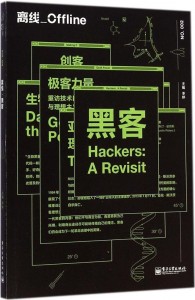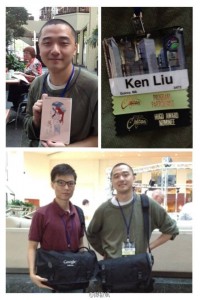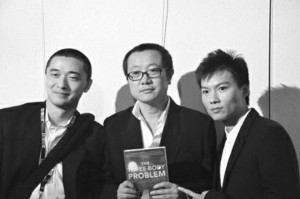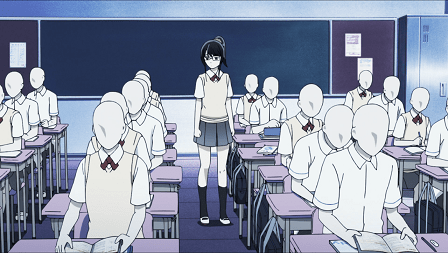
Instead of reading the Chinese original text first, I read the English translation of Coming of Light before turning to the Chinese version. As soon as I finished the English translation by Ken Liu, I knew that it was a great story. The Chinese original text by Chen Qiufan (A.K.A. Stanley Chan) added to my belief. Before writing this article, I read both versions several more times and each time I found something new.
This is not that the kind of story that you can understand completely when you read it for the first time. An ordinary person with an ordinary job and an ordinary family, made up of a successful marketing strategy that blew up an app to the clouds. However, such popularity created trouble for the company and the protagonist himself. He escaped into a temple. The abbot gave the protagonist some hints and let him go. Finally, the protagonist realized the truth and chose to do nothing but welcome his newly-born baby when the universe came to an end.
The core of the story is the free will of human beings, a theme frequently discussed in science fiction works. Stanley used a special way to present his story. The protagonist, Zhou Chongbo, is not a hero, but a NPC (non-player characters). He is passive instead of active. He chooses to escape, not to fight. From the very beginning, when he was dragged to the company by a call, Chongbo was regarded as a pushover by his own wife. Chongbo came up with the idea of how to promote the app under the pressure of his boss. He was forced to shoot the video of a master monk consecrating a mobile phone by his boss. He had to escape from normal life to the life of a monk because of the crazy masses. He was told by the abbot, Master Deta, that he was an NPC. When the stability of universe as a program was threatened, the system “invoked the NPCs to carry out its order to eliminate the threat and maintain the consistency of the universe”. Chongbo’s action was such system-controlled NPC actions according to Master Deta, though Chongbo thought he did everything out of his free will, like all the other NPCs. In the end, when another mission was calling, Chongbo chose not to be involved so as to refuse the destiny of an NPC. He chose to do nothing and thus the entire universe came to an end. This is the rebel of an NPC. Ironically but with warmth, he made the decision because of his wife. The particular decision could be regarded as out of his own free will, as well as his love towards his wife. Chongbo was still passive in the end of the story because he did nothing, but he could also be seen as active because he “chose” not to do anything. This is a story using warmth of family to resolve coldness of universe, which is so different in contemporary Chinese science fiction.

The two keywords of the story are computer science and Buddhism. The last short story with these two keywords I read was Arthur C. Clarke’s The Nine Billion Names of God. Stanley quoted Arthur C. Clarke’s words in Coming of Light: “Any sufficiently advanced technology is indistinguishable at first glance from Buddhist magic.” No, there is no mistake. The author changed magic to Buddhist magic on purpose, because it is the abbot who quoted the sentence in the story. And this abbot was “a promising student at the Computer Science Department of Tsinghua University”, China’s best university. This character might be inspired by the job ad sweeping the internet: “XX Temple is recruiting monks, bachelor’s degree needed, master’s preferred, English proficiency certificate needed.” The job ad was proven to be fake, but we can actually see monks take courses in universities in China these days. Who could be sure that an abbot with a degree from famous universities only appears in a story?
We can also find many other elements reminding us of the reality in contemporary China in the story. We can easily link the image of people relying heavily on modern technology in the story to people around us in reality, or even ourselves. It is so common for people to stare at the mobile phone screen all the time, to look through WeChat Moments when the phone is running out of battery, to suffer phantom pulses even when the phone is not with them. These details are all from life and urge us to reflect on ourselves. On the other hand, the appeal to the sense of safety drove many Chinese people to utilitarian Buddhist beliefs. In the story, Mr. Wan posted a lot of pop-Buddhism news on his dynamic timeline, while the app “Buddhagrams” became extremely popular. We can also see pop-Buddhism news in our WeChat Moments. There are blessings-gaining apps in app store. It is amazing to see how the modern technology has changed the way of people seeking the psychological need for personal security. In the past, believers had to make an effort to go to the temples, burn incense and pray. Now they just need to download an app or repost a message. Technology has made everything easy. But are these who share and forward posts about good deeds really faithful? I doubt it as does the protagonist in the story.

In the English translation, Ken is doing so well that when I read back in Chinese, I couldn’t imagine how he managed to deal all the app names and network buzzwords. Compared to the original Chinese version, my personal impression is that the English version is “cleaner”. Some of the dirty kidding expressions in Chinese have been adjusted by Ken in the English translation. Ken has also added explanations where necessary for English readers who may not be familiar with certain Chinese expressions. This translation has achieved dynamic equivalence perfectly.

Chen Qiufan, or Stanley Chan, which the author preferred to use socially in the West, has recently joined Noitom Ltd., a startup company focusing on motion capture technology. It seems that his job steps closer to science fiction. Though he has already had quite a few short stories translated in English and other languages, it is exciting to see his debut novel The Waste Tide being translated into English.
Ken Liu, the multi-award winning speculative fiction author and translator, plays an important role in introducing Chinese science fiction to English readers. Among the many other awards he won for his own stories, Ken was awarded the Special Contribution Award of Global Chinese Nebula Award in 2014.












2 Comments